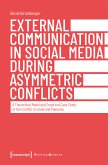An innovative, interdisciplinary perspective on soft power in history, moving beyond the framework of the nation-state
Starting in the nineteenth century, as world events became more interconnected than ever, and as public opinion began to weigh on democratic governments, nations employed new communication strategies and propaganda to gain global influence and prestige. Soft power strategies were used by different nation-states, and by supranational and nonstate actors, that wanted to gain influence on the international stage.
Soft Power Beyond the Nation takes a distinct approach to the study of soft power in history, moving beyond the framework of the nation-state. The volume editors use "soft power" to refer to the processes through which persuasion, the search for influence and power, and public opinion converge in the international arena. The book is organized on the basis of three central themes: the transnational circulation of knowledge and strategies of public diplomacy across borders, collaboration of intermediary actors of soft power whose interests did not always coincide with those of the state, and the role played by nonnational identities, such as gender and race, in soft power.
Soft Power Beyond the Nation enriches the historiographical study of soft power, broadening its temporal and spatial scope and refreshing it with new perspectives on transnationalism, gender, and race. This book will be of interest to scholars and students of history and international relations.
Starting in the nineteenth century, as world events became more interconnected than ever, and as public opinion began to weigh on democratic governments, nations employed new communication strategies and propaganda to gain global influence and prestige. Soft power strategies were used by different nation-states, and by supranational and nonstate actors, that wanted to gain influence on the international stage.
Soft Power Beyond the Nation takes a distinct approach to the study of soft power in history, moving beyond the framework of the nation-state. The volume editors use "soft power" to refer to the processes through which persuasion, the search for influence and power, and public opinion converge in the international arena. The book is organized on the basis of three central themes: the transnational circulation of knowledge and strategies of public diplomacy across borders, collaboration of intermediary actors of soft power whose interests did not always coincide with those of the state, and the role played by nonnational identities, such as gender and race, in soft power.
Soft Power Beyond the Nation enriches the historiographical study of soft power, broadening its temporal and spatial scope and refreshing it with new perspectives on transnationalism, gender, and race. This book will be of interest to scholars and students of history and international relations.
Dieser Download kann aus rechtlichen Gründen nur mit Rechnungsadresse in A, D ausgeliefert werden.









